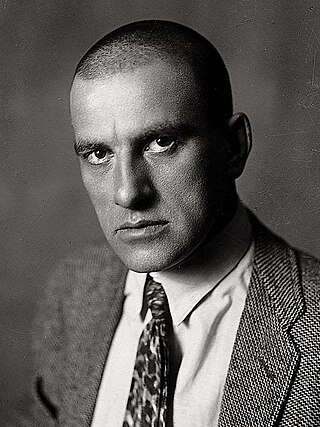
Vladimir Vladimirovich Mayakovsky was a Russian and Soviet poet, playwright, artist, and actor.
Soviet nonconformist art was Soviet art produced in the former Soviet Union outside the control of the Soviet state started in the Stalinist era, in particular, outside of the rubric of Socialist Realism. Other terms used to refer to this phenomenon are Soviet counterculture, "underground art" or "unofficial art".

Izabella Akhatovna Akhmadulina was a Soviet and Russian poet, short story writer, and translator, known for her apolitical writing stance. She was part of the Russian New Wave literary movement. She was cited by Joseph Brodsky as the best living poet in the Russian language. She is known in Russia as "the voice of the epoch".

Apollon Nikolayevich Maykov was a Russian poet, best known for his lyric verse showcasing images of Russian villages, nature, and history. His love for ancient Greece and Rome, which he studied for much of his life, is also reflected in his works. Maykov spent four years translating the epic The Tale of Igor's Campaign (1870) into modern Russian. He translated the folklore of Belarus, Greece, Serbia and Spain, as well as works by Heine, Adam Mickiewicz and Goethe, among others. Several of Maykov's poems were set to music by Russian composers, among them Rimsky-Korsakov and Tchaikovsky.

Ippolit Fyodorovich Bogdanovich was a Russian classicist author of light poetry, best known for his long poem Dushenka (1778).
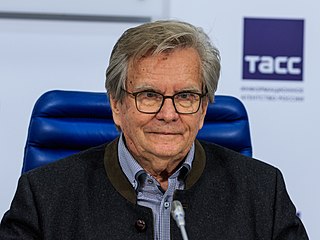
Vladimir Ivanovich Fedoseyev is a Soviet and Russian conductor, accordionist, teacher. People's Artist of the USSR (1980). Laureate of the USSR State Prize (1989) and the Glinka State Prize of the RSFSR (1970). Full Commander of the Order "For Merit to the Fatherland". Artistic director and chief conductor of the Tchaikovsky Symphony Orchestra since 1974.
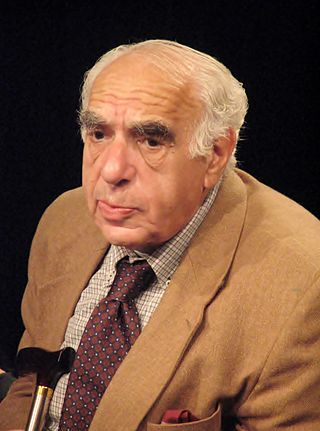
Yevgeny Borisovich Rein is a Russian poet and writer, laureate of the State Prize of the Russian Federation (1997). His poetry won the Pushkin Prize of Russia, Tsarskoe Selo Art Prize (1997), or the Russian National Prize - the Poet (2012).
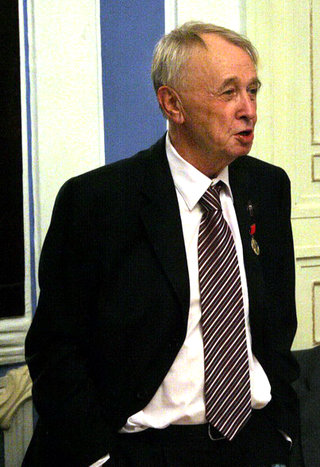
Vladimir Andreyevich Kostrov was a Soviet and Russian poet, translator and playwright. He was also a professor at the Gorky Institute of Literature in Moscow. He had been awarded the State Award of Russia (1985) and the Government Cultural Award (2006).

Mikhail Leonovich Gasparov was a Russian philologist and translator, renowned for his studies in classical philology and the history of versification, and a member of the informal Tartu-Moscow Semiotic School. He graduated from Moscow State University in 1957 and worked at the Gorky Institute of World Literature, the Russian State University for the Humanities, and the Russian Language Institute in Moscow. In 1992 Gasparov was elected a full member of the Russian Academy of Science.
Ivan Vasiliyevitch Yershov or Ershov, PAU, was a Soviet and Russian opera singer. He earned renown for his brilliant performances at the Mariinsky Theatre in Saint Petersburg, performing some of the most demanding roles written for the dramatic tenor voice.
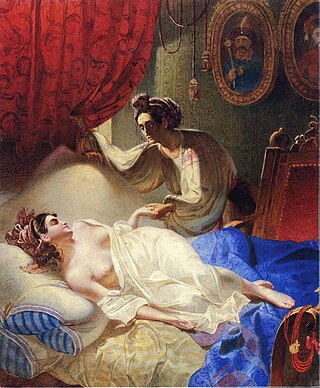
Poltava is a narrative poem written by Aleksandr Pushkin in 1828–29 about the involvement of the Ukrainian Cossack hetman Ivan Mazepa in the 1709 Battle of Poltava between Sweden and Russia. The poem intertwines a love plot between Mazepa and Maria with an account of Mazepa's betrayal of Tsar Peter I and Peter's victory in battle. Although often considered one of Pushkin's lesser works and critiqued as unabashedly imperialistic, a number of critics have praised the poem for its depth of characterization and its ability to synthesize disparate genres. The poem inspired Tchaikovsky's 1884 opera Mazeppa.
Lev Loseff was a Russian poet, literary critic, essayist and educator.

Alexander Borisovich Zhurbin is a Russian composer.

Vladimir Aleksandrovich Kobekin is a Russian composer best known for his opera compositions.
Vladimir Konstantinovich Faltsman is a Russian professor and economist, known for his books evaluating the study of Economics. He is also currently the dean and a professor in the "Russian-German Graduate School of National Economic Management" in Moscow.

Vladímir Admóni was a Soviet linguist, literary critic, translator and poet, doctor of philological Sciences (1947), Professor (1948). Correspondent member of Göttingen Academy of Sciences and Humanities, doctor honoris causa at the University of Uppsala. President of the Bureau of the section of literary translation of the Leningrad branch of USSR. He wrote numerous works of the German language, the theory of grammar, essays about German and Scandinavian literature. Verses, prose memoir, poetic and prose translations from German and the Scandinavian languages to Russian . He published a number of own artistic works written in German language or in German translations.

Alexander Romanovich Oligerov(born February 22, 1965, Temirtau, Russia) is a Russian artist and a member of the Russian Union of Artists.

Vladimir Pimonov is a Russian-born Danish journalist, author and literary scholar. As a journalist he is best known for his investigative reporting on the Soviet/Russian affairs. His literary research focuses on Shakespeare, classics, plot (narrative) theory and the concept of theatricality (metatheatre). His work is held in almost 100 major public and university library holdings around the world.
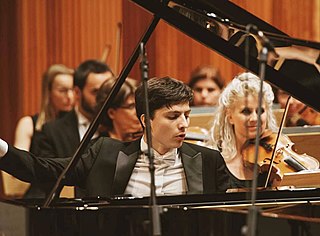
Nikolai Nikolaevich Kuznetsov is a Russian pianist, the winner of the Grand Prix at the “Monte-Carlo Piano Masters 2021”, which is held under the patronage of Albert II, Prince of Monaco.















